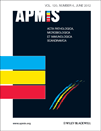
APMIS
Scope & Guideline
Elevating Standards in Immunology and Pathology Scholarship
Introduction
Aims and Scopes
- Microbial Pathogenesis and Host Interactions:
Research on how various pathogens interact with host systems, including studies on microbial virulence factors, immune evasion mechanisms, and the implications of these interactions on disease progression. - Antimicrobial Resistance and Susceptibility:
Investigations into the resistance patterns of pathogens, including molecular mechanisms of resistance, susceptibility testing methods, and the development of novel therapeutic strategies to combat resistant infections. - Clinical Microbiology and Infectious Diseases:
Clinical studies focusing on the diagnosis, treatment, and epidemiology of infectious diseases, including the role of microbiota in various health conditions and the impact of infections on overall health. - Cancer Immunology and Pathology:
Exploration of the immune landscape in cancer, including the role of tumor-associated microbes, immune checkpoint pathways, and the development of biomarkers for cancer prognosis and treatment response. - Innovative Diagnostic and Therapeutic Approaches:
Development and evaluation of new diagnostic tools and therapeutic strategies, including the use of bioinformatics, nanotechnology, and advanced imaging techniques to improve disease management.
Trending and Emerging
- Microbiome Research and Its Clinical Implications:
There is a rising focus on the role of the microbiome in various diseases, including cancer, autoimmune disorders, and infections, emphasizing its potential as a therapeutic target and biomarker. - Advanced Immunotherapy Approaches:
The exploration of novel immunotherapeutic strategies, including the use of monoclonal antibodies and personalized medicine, is gaining momentum, particularly in the context of cancer treatment. - Biofilm Studies in Infections:
Research on bacterial biofilms, particularly their role in chronic infections and resistance, is increasingly prominent, reflecting the challenges they pose in clinical settings. - In Silico and Computational Approaches:
The use of bioinformatics and computational modeling to understand disease processes and therapeutic responses is emerging as a significant theme, aiding in the identification of new targets for intervention. - SARS-CoV-2 and its Variants:
Ongoing studies related to COVID-19, including vaccine efficacy, variant surveillance, and long-term effects of infection, are prevalent, indicating the journal's responsiveness to global health challenges.
Declining or Waning
- Historical Perspectives on Infectious Diseases:
Papers focusing on historical analyses of pathogens and their impacts have decreased, indicating a shift towards more contemporary research and immediate clinical applications. - Veterinary Microbiology:
Research related to veterinary bacteriology and zoonotic diseases has diminished, suggesting a narrowing focus on human health-related microbiological issues. - Traditional Antimicrobial Agents:
Studies centered on older antibiotics and their mechanisms of action are less frequent, as the field moves towards exploring novel compounds and resistance mechanisms.
Similar Journals
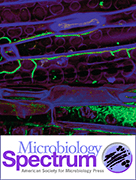
Microbiology Spectrum
Illuminating the intricate world of microorganisms.Microbiology Spectrum is a prominent peer-reviewed journal published by the American Society for Microbiology, dedicated to advancing the field of microbiology through the dissemination of high-quality research. Since its inception in 2013 and continuing until 2024, the journal has established a strong presence in key domains such as microbiology, immunology, cell biology, and ecology, achieving impressive quartile rankings including Q1 in Infectious Diseases and Q1 in Immunology and Microbiology as of 2023. With an emphasis on open access to its scholarly content, Microbiology Spectrum aims to foster collaboration and knowledge sharing among researchers, professionals, and students alike. The journal's scope encompasses a diverse range of topics pertinent to the field, making it an essential resource for anyone involved in microbiological research and its applications. Researchers looking to publish their findings in a respected journal will find Microbiology Spectrum's robust impact factor and Scopus rankings serve as testament to its significance and influence within the academic community.

mSphere
Unleashing the power of molecular exploration.mSphere is a leading open-access journal published by the American Society for Microbiology, dedicated to the dynamic fields of Microbiology and Molecular Biology. Since its inception in 2016, mSphere has rapidly established itself as a reputable source of scholarly research, achieving notable impact factors and excellence within the academic community. The journal ranks in the top quartile (Q1) amongst its peers in Microbiology, and Q2 in the field of Molecular Biology, demonstrating its significance and relevance through Scopus rankings—specifically, it holds the #42 spot out of 182 in the Microbiology category and #108 out of 410 in Molecular Biology. With an editorial commitment to advancing the understanding of microbial and molecular sciences, mSphere provides an accessible platform for researchers, professionals, and students alike to disseminate groundbreaking findings. The journal promotes rigorous peer-review and invites innovative contributions aimed at enhancing microbial research mobility and molecular exploration. Accessible openly since 2016, mSphere continues to thrive as an influential publication driving scientific dialogue and discovery in the microbiological sciences.
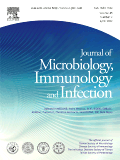
JOURNAL OF MICROBIOLOGY IMMUNOLOGY AND INFECTION
Advancing knowledge in microbiology and immunology.Welcome to the Journal of Microbiology Immunology and Infection, a premier academic publication established in 1998 and now proudly owned by Elsevier Taiwan. As an Open Access journal since 2016, it provides unrestricted access to groundbreaking research in the fields of immunology, microbiology, and infectious diseases, making it an essential resource for researchers, practitioners, and students alike. The journal holds impressive rankings, including Q1 status in categories such as Infectious Diseases and Microbiology (medical), and a notable 92nd percentile in its Scopus ranking for Medicine - Infectious Diseases. With a dedicated focus on advancing knowledge and fostering collaboration within the scientific community, the Journal of Microbiology Immunology and Infection is committed to publishing high-impact research that significantly influences practice and policy in healthcare and life sciences. The journal is also recognized for its contribution to the ongoing dialogue surrounding contemporary issues in immunology and infection, positioning it as a vital platform for scholarly exchange and innovation.

Frontiers in Microbiology
Advancing the Frontiers of Microbial ScienceFrontiers in Microbiology is a leading open-access journal published by Frontiers Media SA, available since 2010, and based in Switzerland. As a prominent platform for innovative research, it specializes in microbiology and medical microbiology, marked by its impressive Q1 classification in the respective fields, reflecting its significant impact and relevance in advancing microbial sciences. With a Scopus ranking of 49th in Microbiology and 41st in Medical Microbiology, this journal is positioned among the top-tier publications, catering to a diverse audience of researchers, professionals, and students. The journal aims to disseminate groundbreaking findings and foster discussions that drive the field forward, ensuring a comprehensive coverage of microbiological studies, from basic research to applications in healthcare and beyond. Enjoy unrestricted access to cutting-edge articles that contribute to both theoretical and applied aspects of microbiology, enriching the scientific community's knowledge base.

MEDICAL MICROBIOLOGY AND IMMUNOLOGY
Unveiling groundbreaking research in medical microbiology and immunology.Medical Microbiology and Immunology is a renowned journal published by Springer, serving as a pivotal resource in the fields of microbiology and immunology. Established in 1971 and continuing its legacy through 2024, this journal features cutting-edge research and reviews that address critical advancements and challenges within these dynamic fields. With an impressive impact factor and a robust ranking, including Q1 categories in both Microbiology (medical) and Immunology, it stands at the forefront of scholarly communication, ranking 21st out of 140 in the realm of Medical Microbiology. Researchers and professionals are encouraged to explore a variety of studies that delve into the interactions between microorganisms and the immune system, making it an essential resource for anyone fascinated by these interconnected realms of health sciences. Although not open access, the journal is widely accessible through institutional libraries, ensuring that significant findings reach a global audience. The University of New York Plaza serves as its operational hub in the USA, reinforcing its international influence and dedication to advancing knowledge in microbiology and immunology.

MICROBIOLOGY AND IMMUNOLOGY
Unveiling the Secrets of Pathogens and Immune ResponsesMICROBIOLOGY AND IMMUNOLOGY, an esteemed journal published by WILEY, serves as a vital resource for researchers and professionals in the fields of microbiology, immunology, and virology. With its ISSN 0385-5600 and E-ISSN 1348-0421, this journal has been a cornerstone in scientific literature since its inception in 1977, bridging decades of research and innovation through its comprehensive coverage of emerging trends and discoveries. Although this journal operates without open access, it maintains a commendable presence in academic circles, reflected in its 2023 Quartile rankings of Q3 across the categories of Immunology, Microbiology, and Virology. As part of an important discourse in these disciplines, MICROBIOLOGY AND IMMUNOLOGY ensures its scholarly contributions are relevant to both seasoned researchers and emerging scholars. Positioned in a competitive journal landscape, with Scopus ranks indicating a median percentile across its fields, it remains committed to advancing knowledge through peer-reviewed articles, thereby supporting the continuous evolution of its focus areas. The journal's current scope encompasses topics critical for understanding pathogen-host interactions and the immune response, making it a crucial publication for any academic library or individual scholar dedicated to the biological sciences.
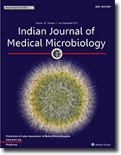
Indian Journal of Medical Microbiology
Your Gateway to Open Access Microbiological ResearchIndian Journal of Medical Microbiology, published by Elsevier, is a pivotal peer-reviewed journal dedicated to the field of medical microbiology, providing a vital platform for research and scholarship since its inception in 1986. With an Open Access model established in 2001, it ensures the dissemination of scientific knowledge to a global audience, enhancing accessibility for researchers, professionals, and students alike. The journal's scope spans critical areas including immunology, infectious diseases, and microbiology, with an impressive trajectory marked by converged years of publication allowing for a comprehensive exploration of evolving scientific trends. As of 2023, the journal holds a Q3 ranking in Infectious Diseases and Microbiology (medical) and a Q4 ranking in Immunology and Microbiology categories, reflecting its significant yet growing impact in the field. Researchers seeking to contribute to or stay updated on the latest advancements in medical microbiology will find the Indian Journal of Medical Microbiology a valuable resource, as it consistently bridges the gap between emerging science and clinical application.
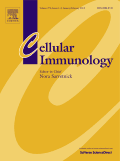
CELLULAR IMMUNOLOGY
Advancing the Frontiers of Cellular ImmunityCELLULAR IMMUNOLOGY is a prestigious journal published by Academic Press Inc. Elsevier Science, dedicated to advancing the field of immunology. Established in 1970 and converging ongoing research up to 2024, this journal has carved out a significant niche within the academic community, boasting a notable Q2 ranking in the Immunology category and holding a respectable 67th percentile ranking within Scopus for its contributions to the disciplines of Immunology and Microbiology. The journal serves as a vital platform for disseminating high-quality research, reviews, and methodologies that elucidate the intricacies of cellular immune responses, thereby benefiting researchers, professionals, and students alike. Although it does not offer open access, the journal's impact is evidenced by its comprehensive coverage of pioneering studies and ongoing developments in the immunological sciences, positioning it as an essential resource for those seeking to deepen their understanding and engage with the latest findings in cellular immunology.
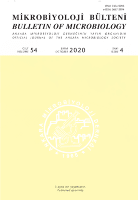
MIKROBIYOLOJI BULTENI
Exploring Innovations in Infectious Disease ResearchMIKROBIYOLOJI BULTENI, with ISSN 0374-9096, is a prestigious academic journal published by the ANKARA MICROBIOLOGY SOC, located in Ankara, Turkey. Established in 1973, this journal has been a vital conduit for disseminating research in the fields of Immunology, Microbiology, and Infectious Diseases, garnering a reputation as a significant contributor to the scientific community. The journal is currently ranked in the Q3 category within Immunology and Microbiology (miscellaneous), and Infectious Diseases, indicating its impactful presence amidst contemporary research. With access options that may be restricted, MIKROBIYOLOJI BULTENI actively welcomes submissions that advance the understanding of critical microbiological principles and practices, thereby supporting both national and international research efforts. Researchers, professionals, and students are encouraged to explore the latest findings shared in this journal, as it continually shapes the landscape of microbiology and infectious disease studies through its comprehensive and rigorous peer-reviewed publications.

Cell Host & Microbe
Pioneering Insights into Microbial DynamicsCell Host & Microbe is a premier journal published by CELL PRESS, dedicated to advancing the field of host-microbe interactions and infectious diseases. With an impact factor reflecting its esteemed position among scholarly publications, this journal not only focuses on the intricacies of microbiology but also delves into critical areas such as Cancer Research, Immunology, and Molecular Biology, maintaining a distinguished Q1 ranking across several categories. Since its inception in 2007, Cell Host & Microbe has been at the forefront of disseminating high-quality research, providing invaluable insights for researchers, professionals, and students alike. The journal is committed to promoting understanding of the complex relationships between microbial entities and their hosts, filtering groundbreaking research from the top echelons. Located in the heart of Cambridge, MA, USA, this journal serves as an essential resource for anyone looking to deepen their knowledge in microbiology and its applications in health and disease.